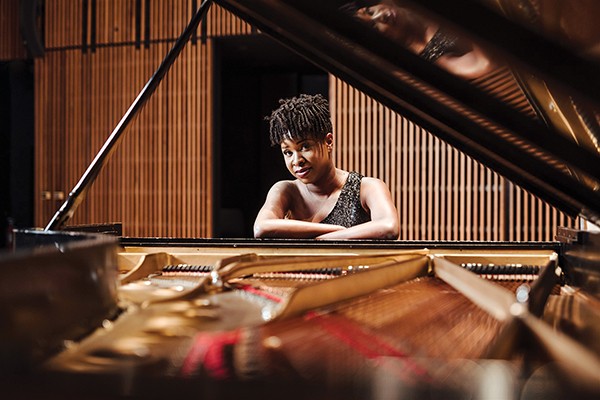Artina McCain, assistant professor of piano at University of Memphis, is a busy woman. In addition to teaching and performing locally, she and husband Martin McCain, a bass trombonist who teaches at Texas State University, regularly tour as a duo. And she produces concerts and programs on her own on an international scale. Given all that, it’s not surprising that when I do catch up with her to discuss A Celebration of Black Composers, her concert with three other artists at Crosstown Theater on Friday, she’s halfway around the world.

Artina McCain
Memphis Flyer: Where are you calling from?
Artina McCain: I’m in Malaysia now. My husband is playing here, and I’m tagging along, doing some concerts and master classes. And then we’re going to Bangkok to play a concert for bass trombone and piano at Mahidol University.
Who will be joining you for the concert at Crosstown Theater?
The performers are James Rodriguez, a baritone who teaches at Texas Christian University; and a soprano, Gwendolyn Alfred, who teaches at Texas Southern University; and then a local cellist, Alisa Horn, will join us for some chamber works and also a solo feature of the George Walker Sonata for Cello and Piano, Movement II. And then, of course, myself on piano.
James and I performed a few years ago in a black composers concert in Austin, Texas. We had sold-out shows every weekend, so for the last two years or so, James and I — and we added Gwendolyn — have been doing this tour of works for voice and piano primarily, and some chamber music, by black composers. In the upcoming concert, I’ll play with everybody, James will sing some pieces by himself, Gwen will sing some pieces by herself, and we’ll do some trio stuff. So we’ll have a lot of variety, with baritone, soprano, and cello, and I’ll also be playing some solo piano works.
Who are some of the composers you’ll be spotlighting?
One piece is by William Grant Still. It’s called “A Deserted Plantation.” It’s based on poetry by Paul Laurence Dunbar, who many people may know, and it was commissioned by a famous composer in his era, Paul Whiteman. The first movement, “Spiritual,” is a pretty popular gospel tune in the black church, called “I Want Jesus to Walk with Me.” The third movement of “A Deserted Plantation” sounds like something that people would dance to in a club back in the ’50s or ’60s. It’s a kind of ragtime music that we might associate with New Orleans.
So in combining such forms with his conservatory training, he was sort of a Gershwin-type figure.
Yeah. It’s funny that you say that because he was the first, actually. He was before Gershwin, but Gershwin got more of the credit for using genres like the blues.
Is Florence Price part of this program?
Yes, she is. Florence Price is making a resurgence these days. James will be performing a few of her pieces, like “A White Rose” and “Song to the Dark Virgin,” with poetry by Langston Hughes.
Who are some of the other composers involved?
Gwendolyn will be performing pieces by Moses Hogan, who did quite a number of arrangements of negro spirituals. Then we’re doing a piece by Undine Smith Moore, “Love Let the Wind Cry.” And to bring the cellist in the group, we’ll be doing a piece by George Walker, a Pulitzer Prize-winning composer who just passed away last year. There’s a lot of diversity in the programming, from the negro spiritual to maybe the more stereotypical classical art song. It’s such a fusion of genres that most people will feel it’s very familiar.
A Celebration of Black Composers, Friday, Sept. 13th, at Crosstown Theater, 7:30 p.m., $12; A Celebration of Black Female Composers, Sunday, Sept. 15th, at Harris Hall, University of Memphis, 7:30 p.m., free.